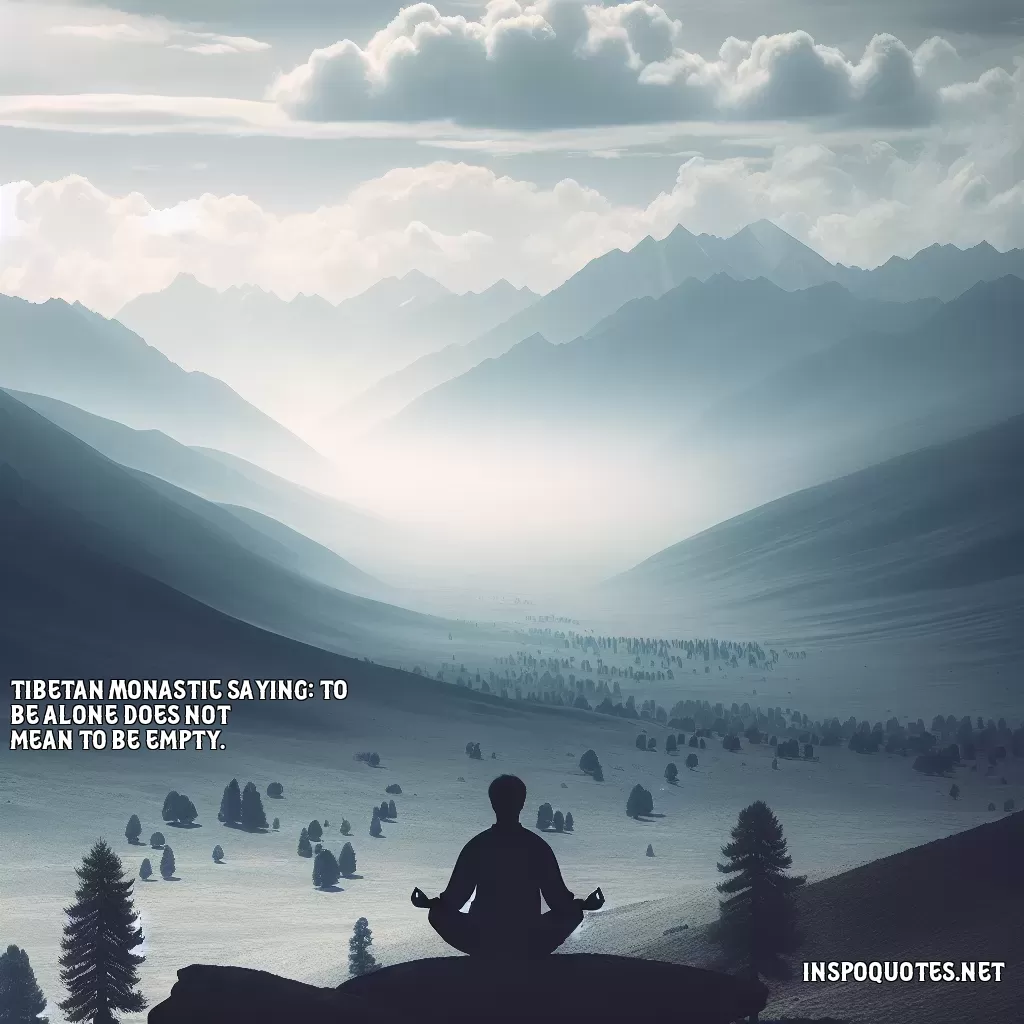
Tibetan Monastic Saying: To be alone does not mean to be empty.
Author: Sogyal Rinpoche
👁️ 3 views
The Tibetan monastic saying, "To be alone does not mean to be empty," conveys a profound philosophical and spiritual perspective rooted in Buddhist thought. This saying challenges the common misconception that solitude equates to a void or lack of fulfillment. Instead, it suggests that being alone can be a state of completeness and richness, rather than one of deficiency. In many cultures, being alone is often associated with loneliness or emptiness, implying a negative state of being. However, this saying invites us to reconsider such associations and to recognize the potential that solitude holds for personal growth and self-discovery. From a Buddhist perspective, solitude offers a space for introspection and meditation, essential practices that allow individuals to delve deeper into understanding their true nature, free from external distractions and societal expectations. By embracing solitude, one may find inner clarity and peace, uncovering layers of self-awareness and enlightenment. It suggests that fulfillment and contentment come from within, rather than external validation or company. This mindset encourages individuals to perceive solitude not as an emptiness that needs to be filled, but as an opportunity to cultivate a fuller sense of self. Ultimately, "To be alone does not mean to be empty" highlights the rich potential of solitude as a transformative, fulfilling experience where one can find true happiness and contentment internally. It is an invitation to appreciate the value of one's own company and find richness in the depths of one's solitary journey.
Quote By: Sogyal Rinpoche
Sogyal Rinpoche, a prominent Tibetan Buddhist teacher and author, was born in 1947 in Tibet. He was recognized as the reincarnation of a revered lama at a young age and received extensive training in the teachings and practices of Tibetan Buddhism. Sogyal Rinpoche was a disciple of the eminent teacher Dilgo Khyentse Rinpoche and spent many years studying and practicing under his guidance. In the late 1950s, amid the turmoil of the Chinese invasion of Tibet, Sogyal Rinpoche fled to India, where he continued his spiritual journey and began to share the teachings of Buddhism with a broader audience.
In the 1970s, Sogyal Rinpoche began to teach in the West, where he quickly gained recognition for his ability to convey the profound and intricate philosophies of Tibetan Buddhism in an accessible manner. His teachings emphasized the importance of mindfulness and the transformative power of compassion and love. One of his most notable contributions to the Dharma was the book "The Tibetan Book of Living and Dying," published in 1992. This seminal work integrates traditional Tibetan Buddhist teachings with contemporary psychology and has been influential in the fields of spirituality, psychology, and end-of-life care. The book has been translated into numerous languages and continues to resonate with readers worldwide, illustrating Sogyal Rinpoche's ability to bridge the ancient wisdom of Buddhism with modern sensibilities.
Sogyal Rinpoche was the founder of the Rigpa movement, a network of Buddhist centers dedicated to the study and practice of Tibetan Buddhism. Through Rigpa, he aimed to create a vibrant community where students could explore the depths of Buddhist teachings and practice under the guidance of qualified teachers. Sogyal Rinpoche's teachings have inspired countless individuals on their spiritual journeys, promoting a path of inner peace, compassion, and understanding.
Despite facing controversies later in life, including allegations of misconduct, Sogyal Rinpoche's impact on the spread of Tibetan Buddhism in the West remains significant. His life and work continue to influence practitioners of all backgrounds, making him a key figure in contemporary Buddhism. Sogyal Rinpoche passed away in 2019, leaving behind a legacy that continues to inspire and guide seekers of truth and inner peace.